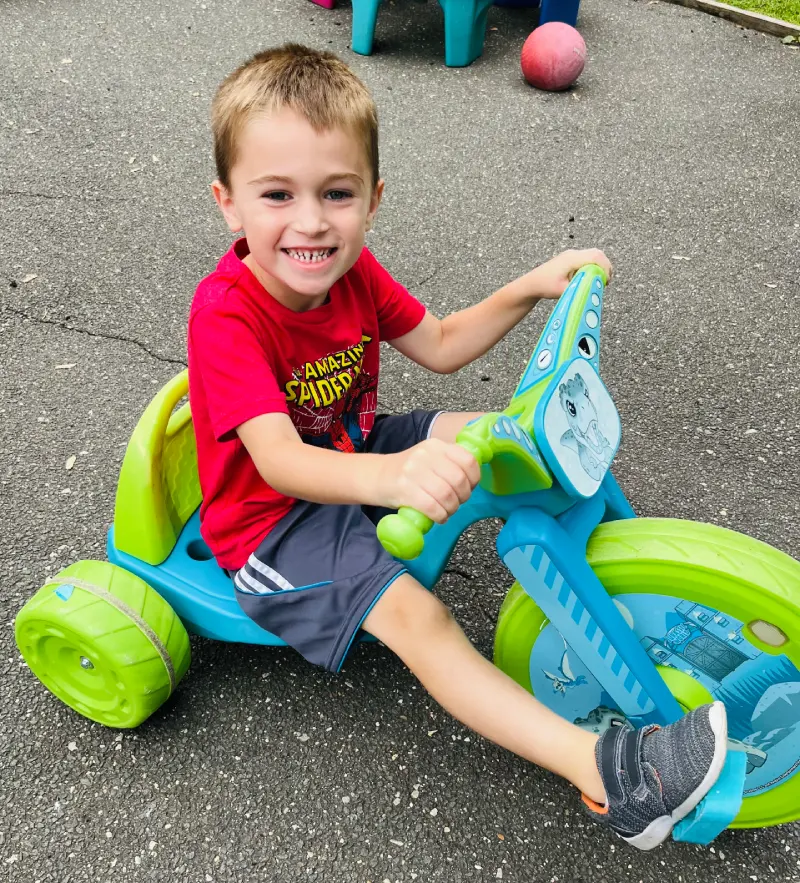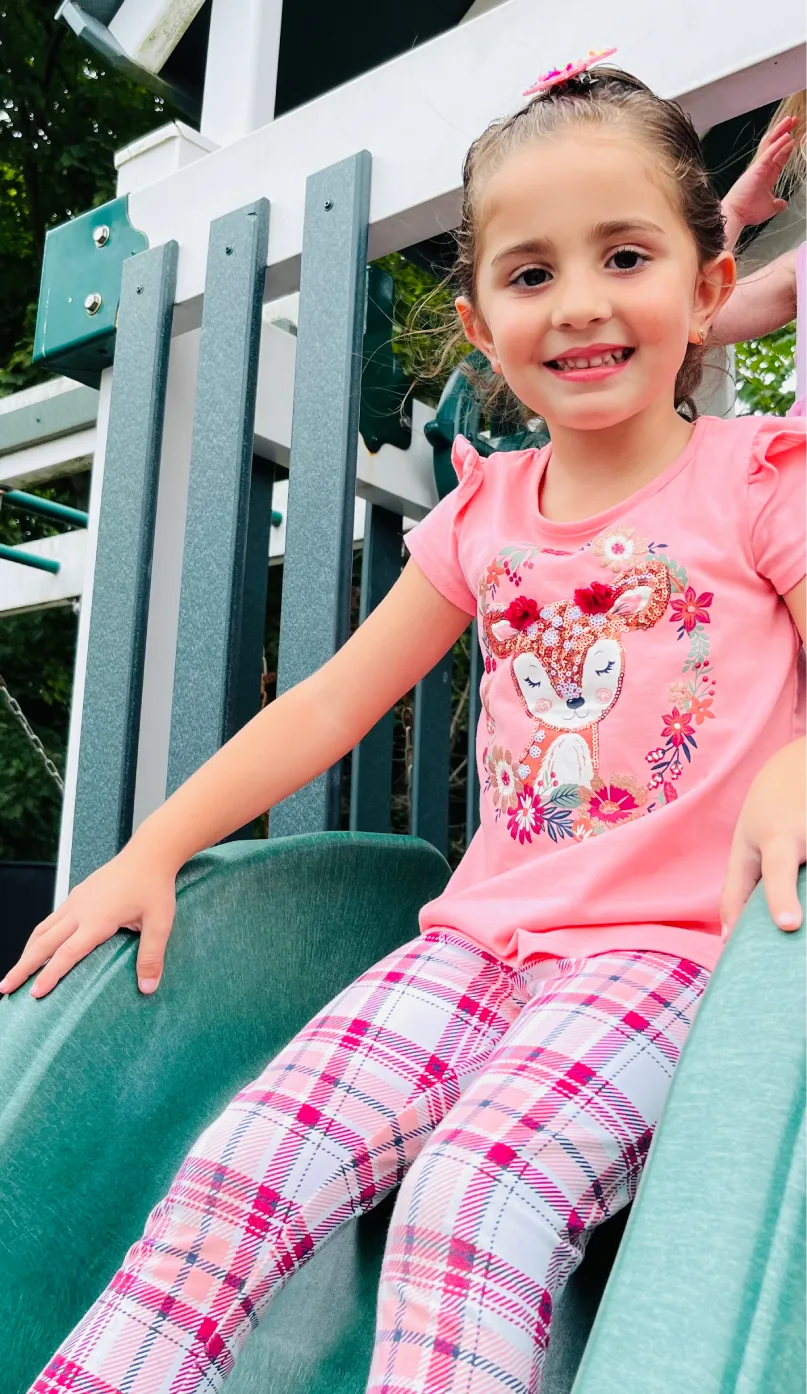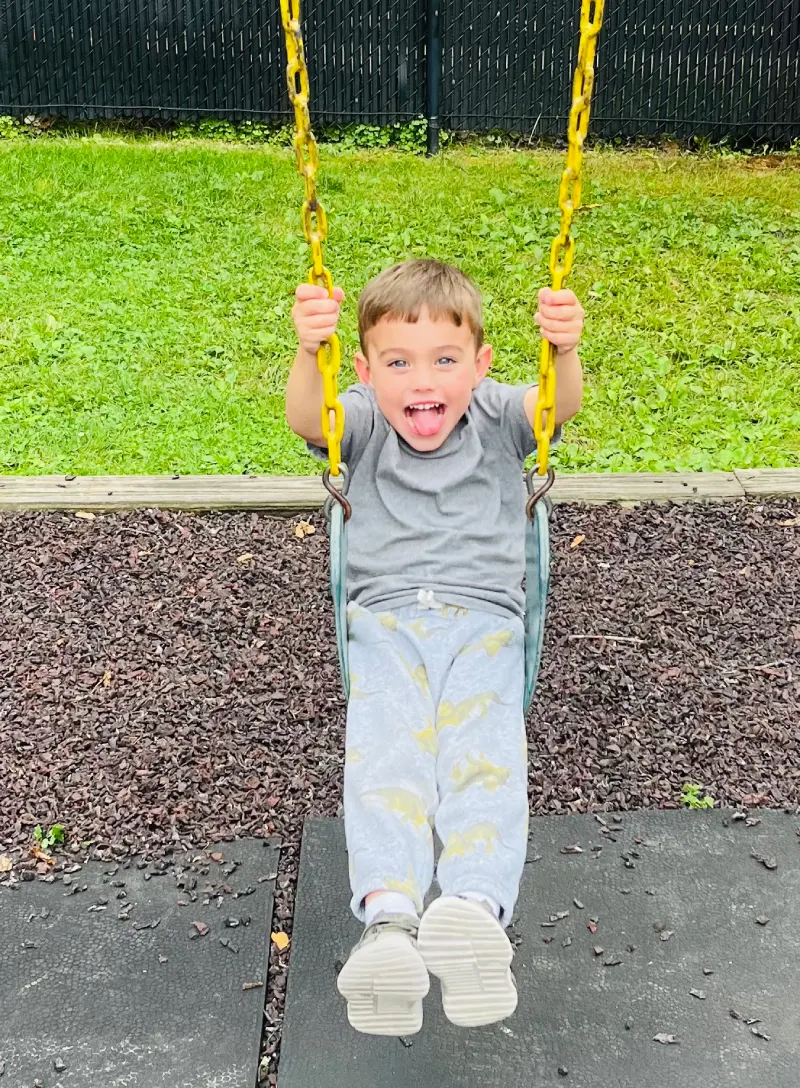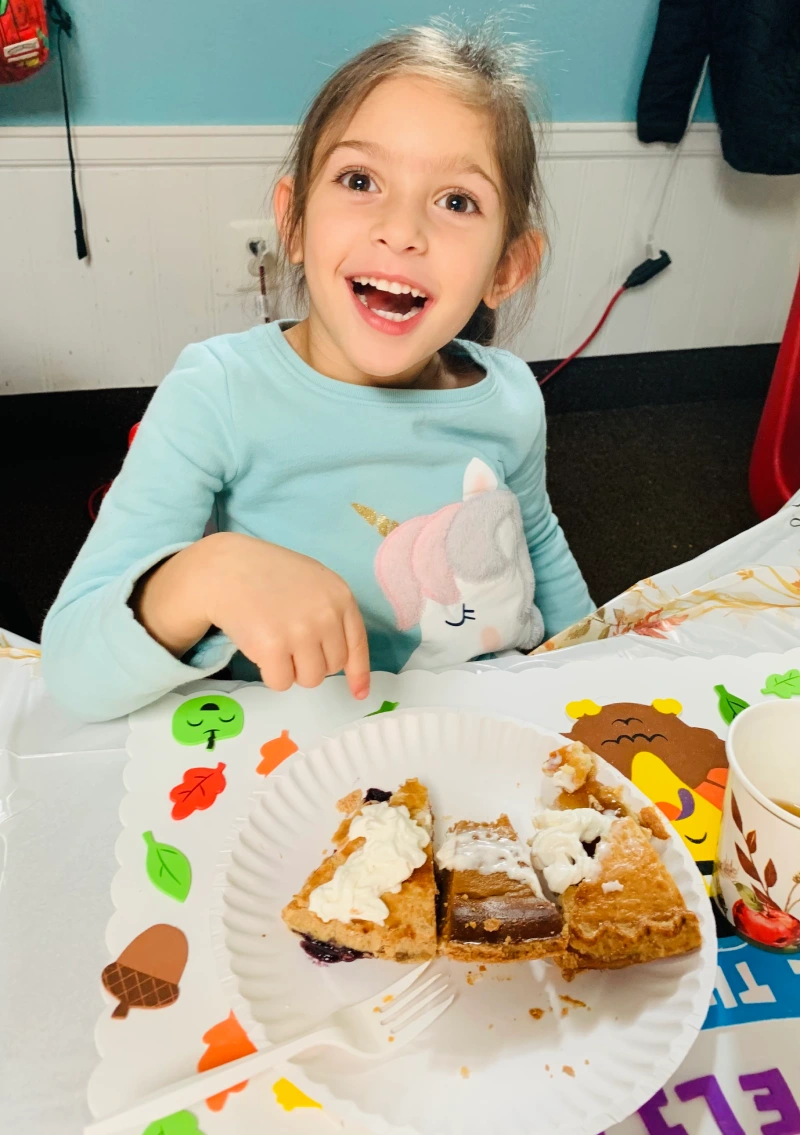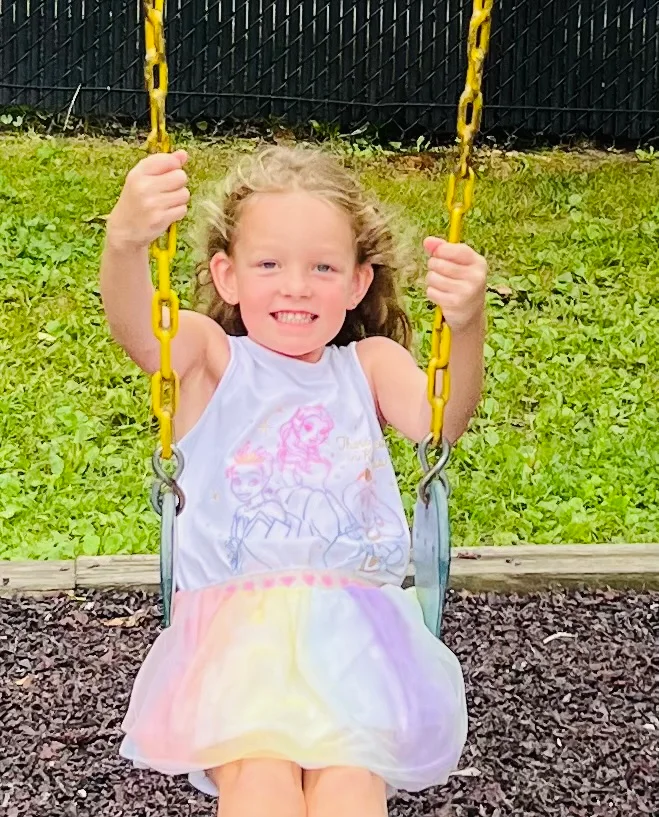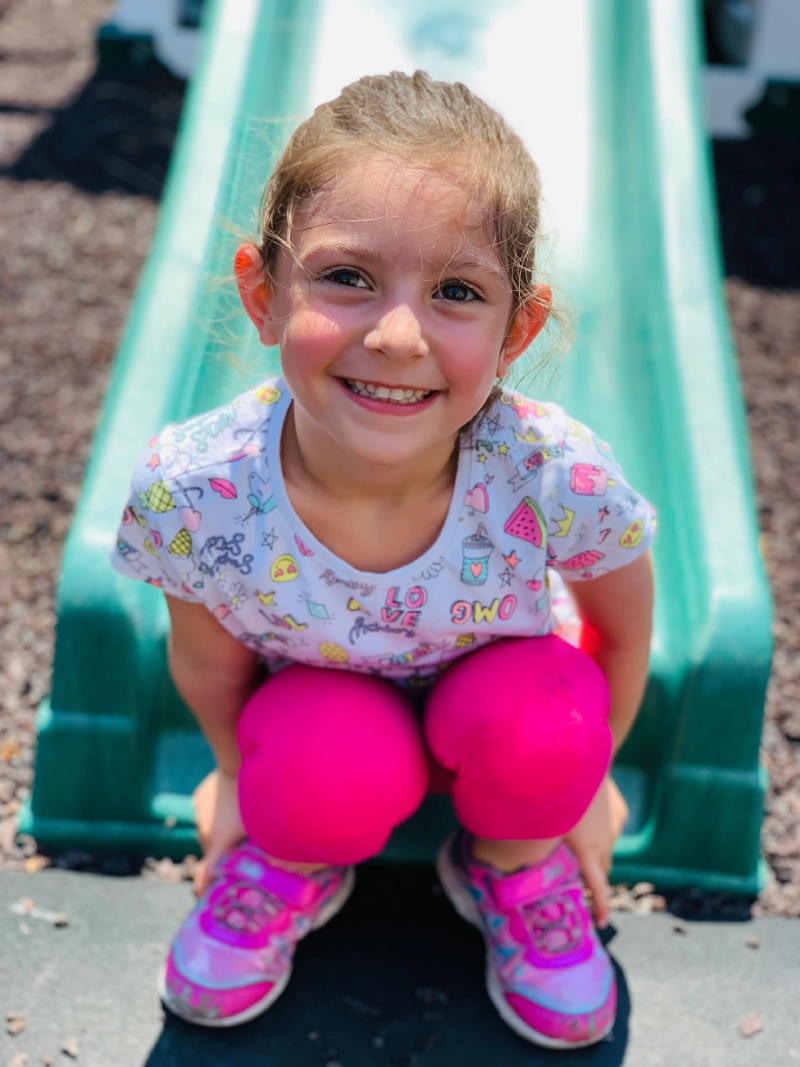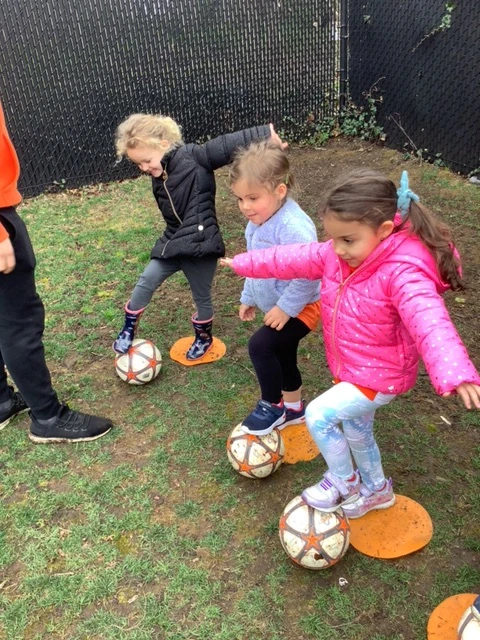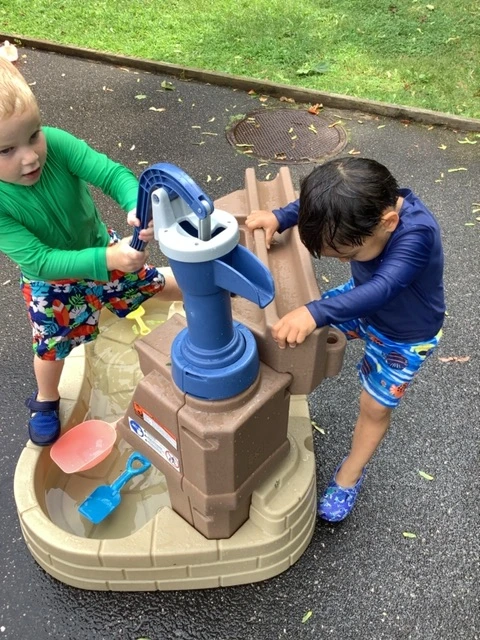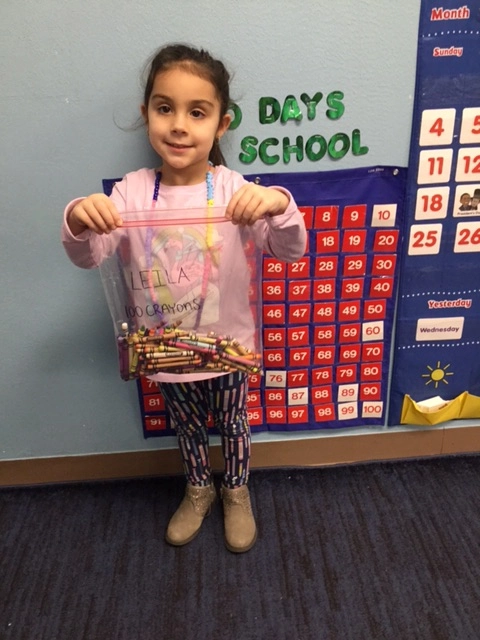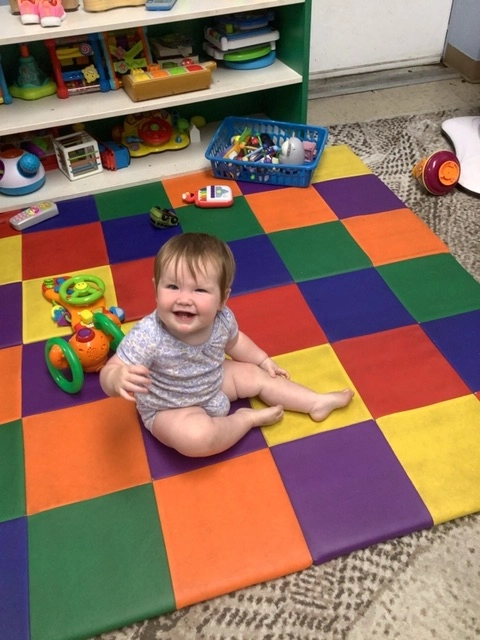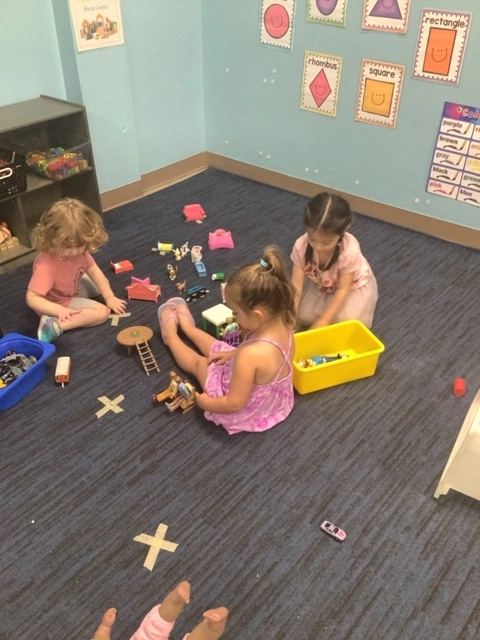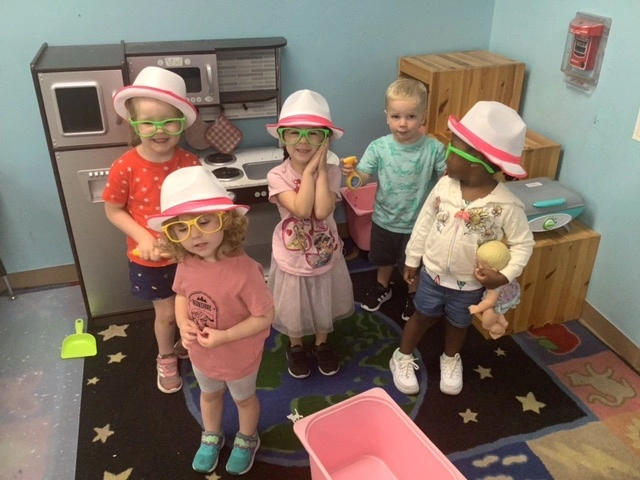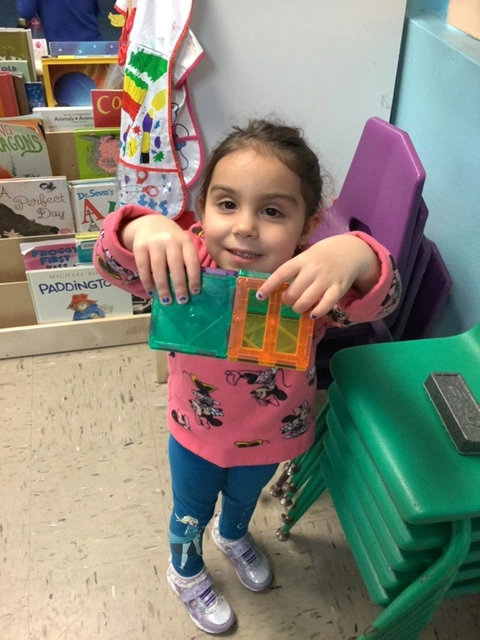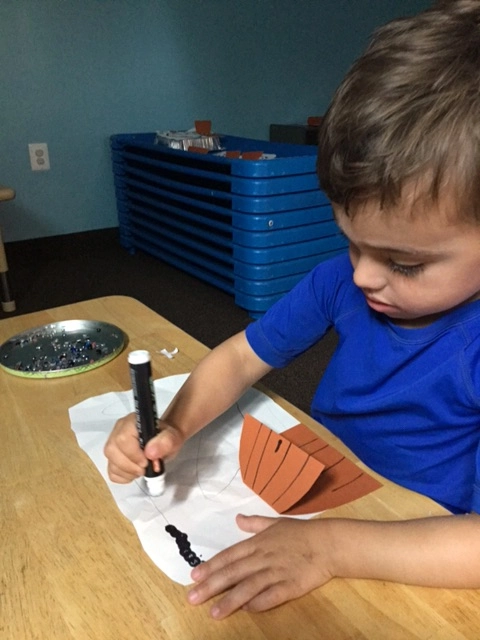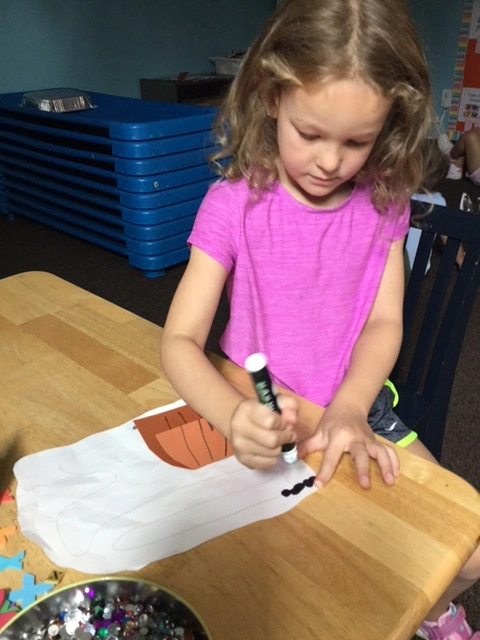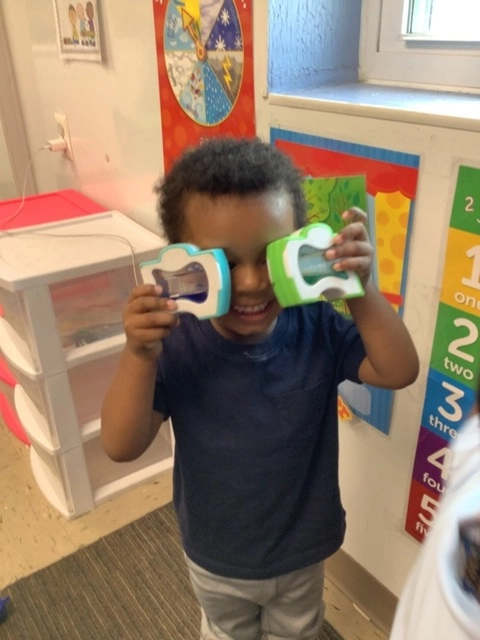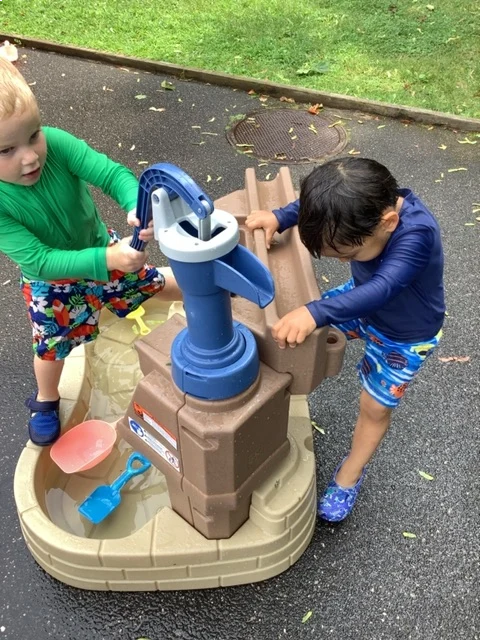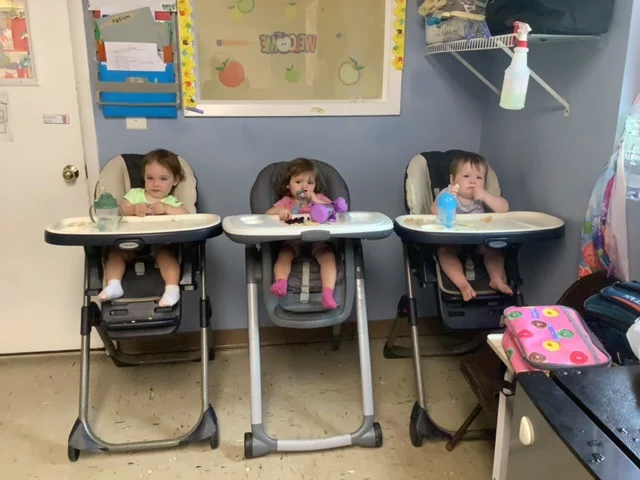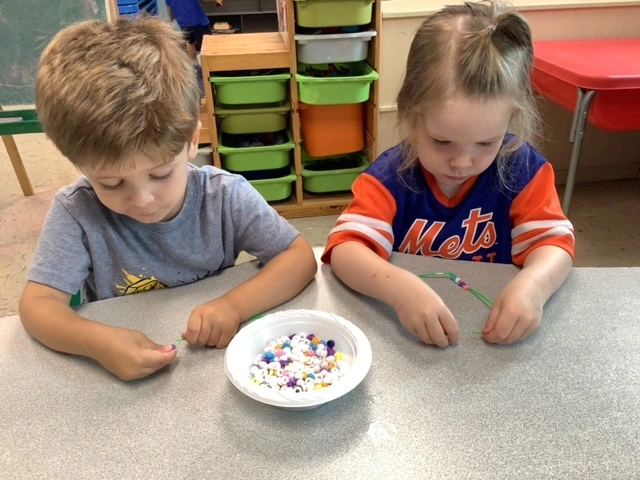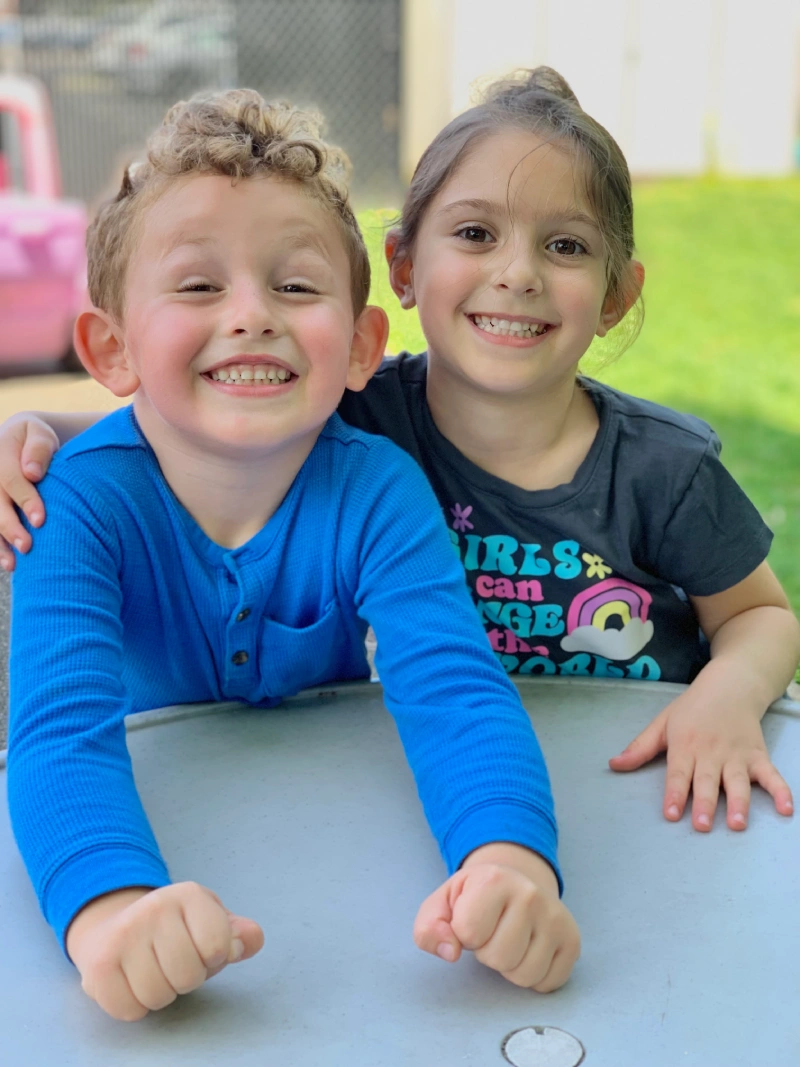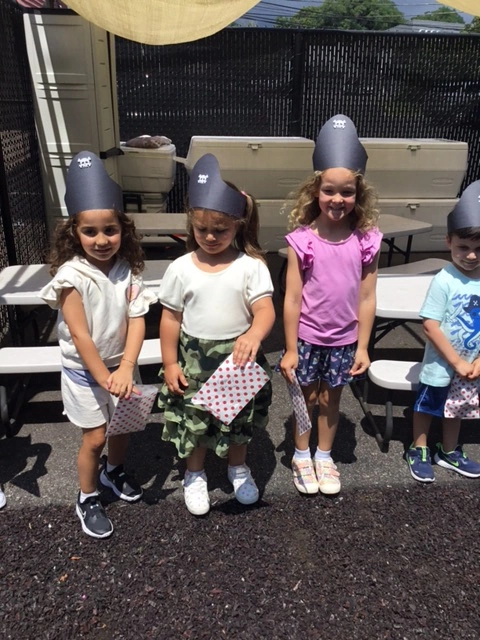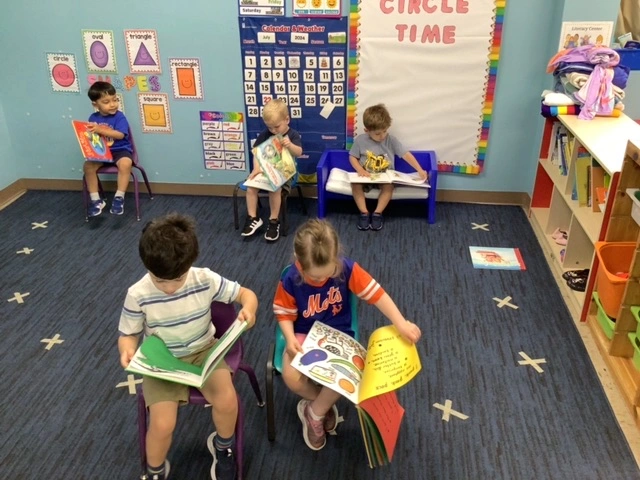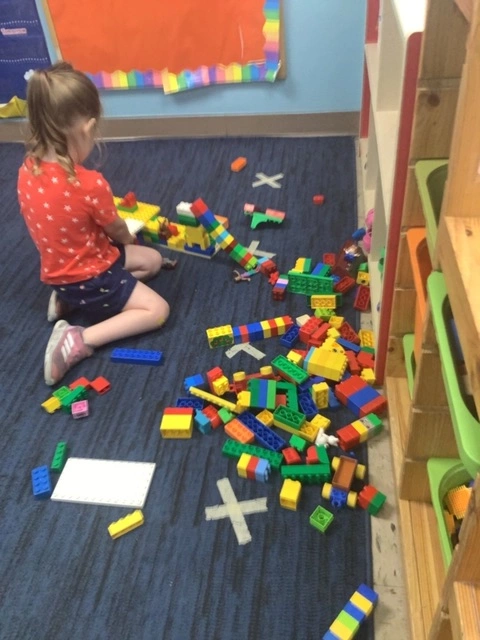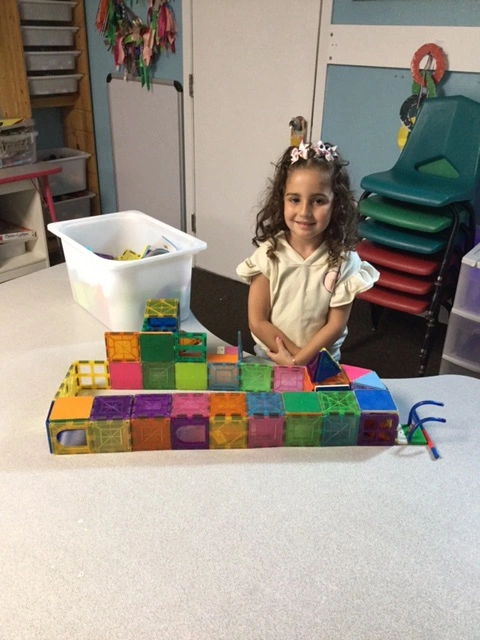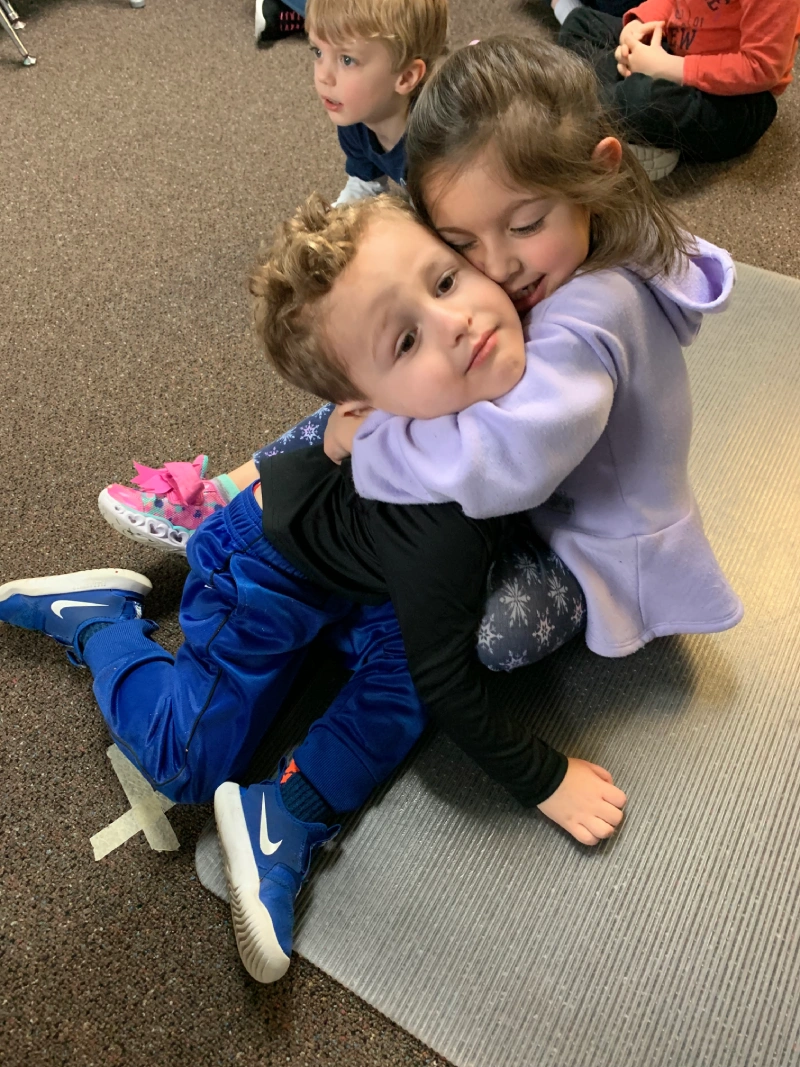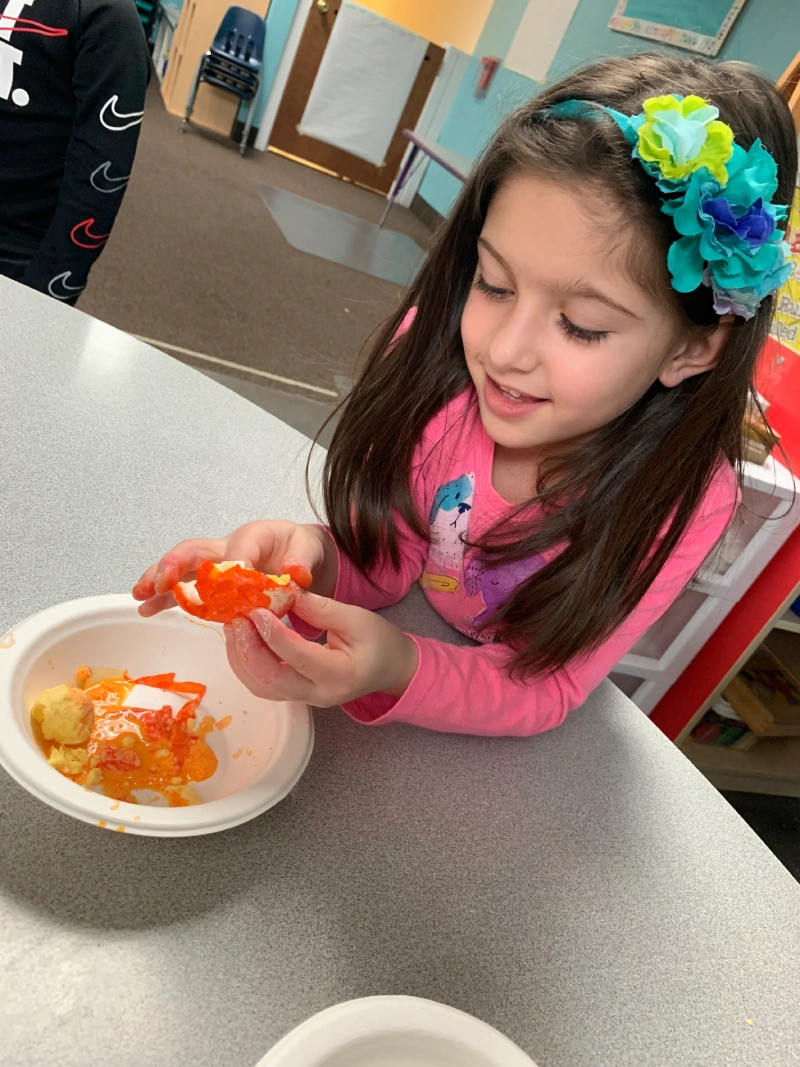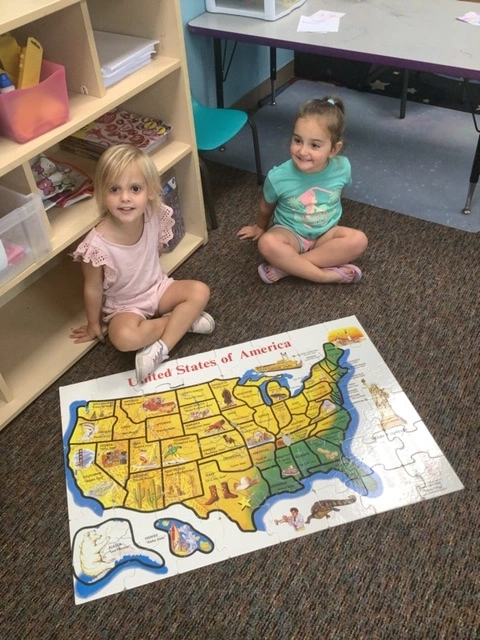Little Rascals Day Care
Our center is designed to encompass the developmental needs of all children. We believe that the early years are the most important learning years. We also believe that children learn best through play and discovering on their own. Our goal is to foster a love of learning. We allow children to grow and learn at their own pace by offering a wide variety of age and developmentally appropriate activities. We encourage children to be confident, independent learners. We believe that promoting growth in all developmental areas (socially, emotionally, cognitively, physically, and creatively) will help the child grow into a successful well-rounded member of their community.
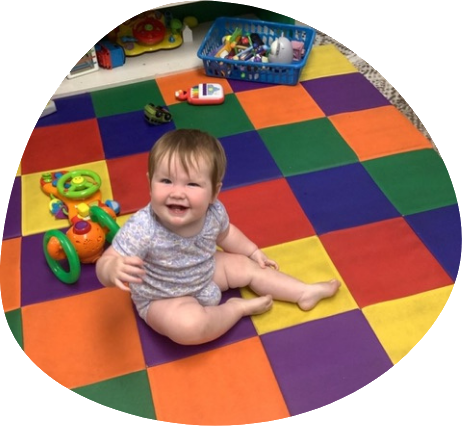
Activities and Programs
Learning Centers
Learning stations are set up in each room so that the children are exposed to a diversity of ideas, concepts, and skills. The stations are designed to meet the developmental needs group of children. Some learning areas are family life, manipulatives, library, arts and crafts, and blocks.
Learn More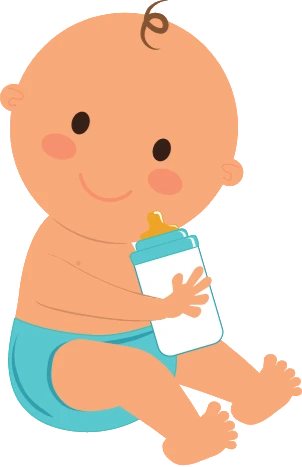
6 Weeks – 12 Months
6 Babies Maximum in a class 4:1 Child/Teacher Ratio
All of our infants are at different levels since there is a range of ages. It is important to remember that children develop at their own pace. This is especially true for infants. The teachers follow the schedules you are following at home. Some activities that are done throughout the day for gross motor skills are tummy time, sitting up, crawling, walking, dancing, hugging, and playing with toys. The infants also work on their Fine Motor Skills by finger painting, grasping toys, learning how to hold a bottle, and feeding themselves. The infants have a small circle time where the teachers sing and read to the babies. The curriculum for this classroom includes colors and shapes. You can find the curriculum for this room posted in the classroom.
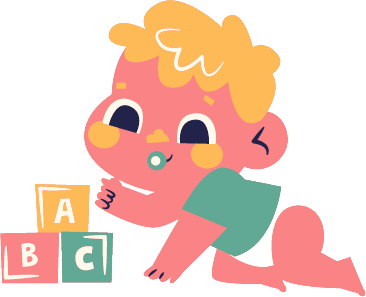
12 Months – 18 Months
4 Babies Maximum in a class 4:1 Child/Teacher Ratio
Our day starts with a short circle time singing songs, reading books, and looking at pictures. We begin identifying body parts and repeating different sounds and words. Social skills are being introduced and reinforced throughout the day every day in this room. Creativity is also encouraged throughout the day in this room through painting, dancing, singing, and coloring. We use tissue paper and different mediums for the children to gain sensory experiences. The children play with large peg puzzles, soft building blocks, walking toys, pop-up toys, instruments, balls, and various books just to name a few. The children are also learning how to use a spoon and fork to feed themselves at mealtimes although the teacher is there to help. The curriculum for this classroom includes letters, colors, and shapes. You can find the curriculum for this room posted in the classroom.
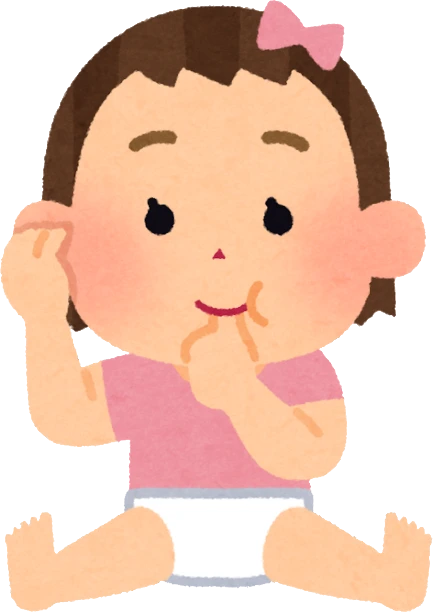
18 Months – 24 Months
7 Toddlers Maximum in the class 5:1 Child/Teacher Ratio
In this class, the children start to learn different things each week. At circle time the children sing songs, count, go over body parts, learn the colors and shapes, and discuss the theme of the week. There is a story time that relates to the theme. Our class has music and movement sessions that include activities such as using a tunnel, dancing, bean bag tossing, and musical instruments. We offer sensory experiences including bubbles, play-doh, finger paint, tissue paper, pompoms, yarn, chalk, sensory blocks/balls, and water play. Every day there are theme-related art projects that you will see displayed around the classroom. Gross Motor Skills are encouraged through dancing, ball play, outside play with climbers and slides as well as walking/pushing/pulling toys. Fine motor skills are encouraged with hand-over-hand serving, the use of spoons and forks, large crayons/markers, paint brushes, and pegged puzzles. We also help with the transition from bottles to sippy cups in this room. Language development is a main goal in this classroom. We encourage the children to use their words and to try to speak in short sentences all throughout every day. The curriculum for this classroom includes letters, numbers, colors, and shapes. You can find the curriculum for this room posted in the classroom.
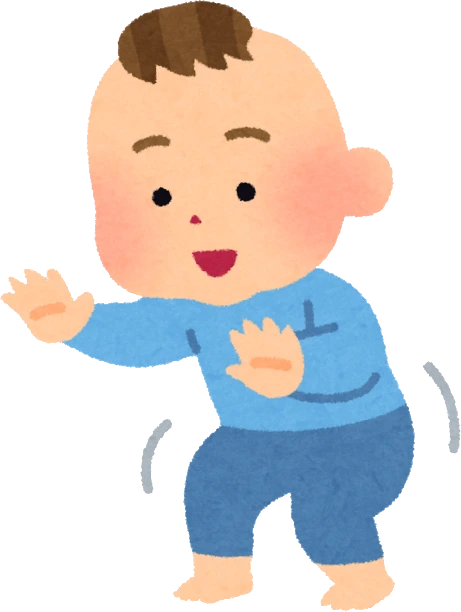
2-3 Years Old
9 Children Maximum in the class 5:1 Child/Teacher Ratio
In this class, we have circle time every morning. We read stories, go over colors and shapes, count, sing songs, talk about the weather, and begin to learn our ABCs. We work on Gross Motor Skills throughout the day. We do this by dancing, catching bubbles, and bean bag toss, crawling through tunnels, and of course, playing on the playground. We also work on Fine Motor Skills by sorting shapes, doing puzzles, stringing beads, using large legos, block building, playing dough, finger painting, painting with a brush, and coloring with crayons and markers.
The children have Free Play every day. They are given choices within the different centers they want to play with. Our centers include Dramatic Play, Blocks, Library, and Puzzles. The curriculum for this classroom includes letters, numbers, monthly themes/concepts, colors, and shapes. You can find the curriculum for this room posted in the classroom.
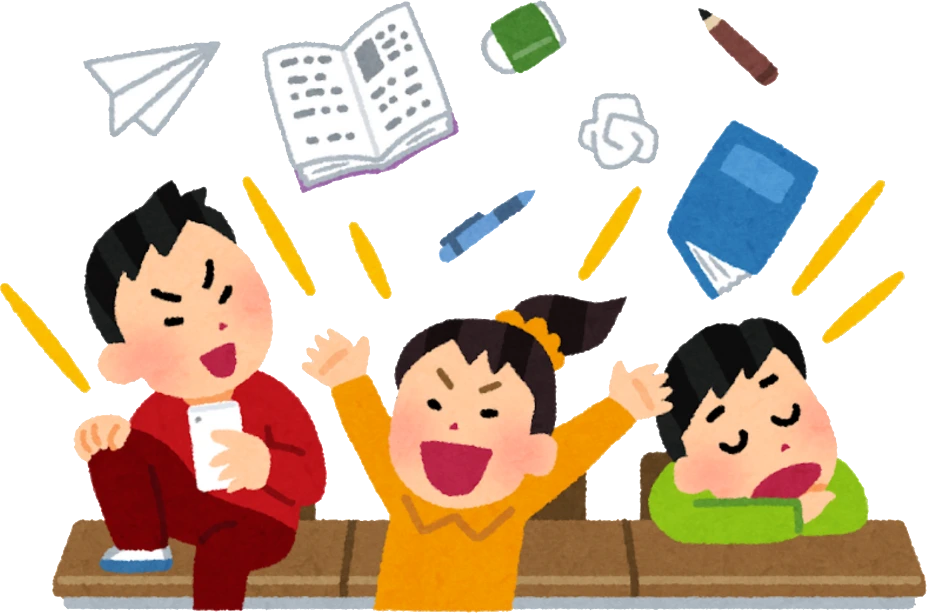
3 Years – 4 Years
14 Children Maximum in the class 7:1 Child/Teacher Ratio
Our Pre-School starts the year learning about themselves and their family. We work on recognizing and sounding out letters, and recognizing numbers, colors, and shapes. Music is included in so much we do in this class whether it’s playing instruments to music, learning songs and nursery rhymes or we just feel like singing a song. A main goal in this room is teaching appropriate classroom and playground behavior as well as other program and classroom procedures. In our classroom, we have centers for the children to play, work and learn in such as Blocks. Dramatic Play, Puzzles, Art, Science/Sensory and Library. We incorporate cooking activities and learn all about the holidays with theme-related projects and parties as we offer optional homework so you can take an active part in going over things with your child that we have done at school. We also have a show and tell day and bring your favorite book to school day once a month. The curriculum for this classroom includes letters, numbers, monthly themes/concepts, colors, and shapes. You can find the curriculum for this room posted in the classroom.
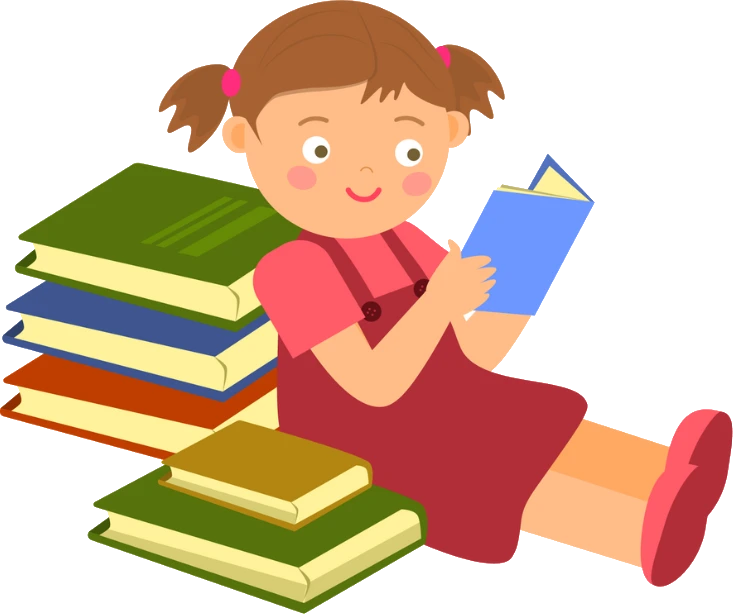
4-5 Years Old
(Upstairs) 15 Children Maximum in the class 8:1 Child/Teacher Ratio
As your child starts to get ready for Kindergarten in our Pre-K PALS class they are learning in the areas of Fine Motor Skills, Reading Readiness, Math Readiness, Language/ Listening Development, Physical Development as well as many other skills. The teachers work with all of the children in all the areas but also with individual children in more specific areas where growth is needed. The morning circle time includes name recognition, birthday/age recognition, colors, shapes, letters, counting numbers 1-100, seasons, weather, calendar skills (the year, days of the week, months of the year, yesterday, today, tomorrow), USA presidents, solar system, USA Map, World Map and where we all live. We focus on and reward positive behavior with goal charts, Mr. Bear points, and of course, our Kindness Wreath. We learn through play every day during choice time in one of the centers such as Blocks, Literacy, Art, Easel, Table Tops, Puzzles, Music/Movement, Science, Sensory or Dramatic Play. The curriculum for this classroom includes letters, numbers, monthly themes/concepts, colors, and shapes. You can find the curriculum for this room posted on the parent board outside of the classroom. We also incorporate cooking activities as well as many theme/concept-related projects. We also send home optional Scholastic Reader homework a few times a month so you can take an active part in going over things with your child that we have done at school. We collect the homework and go over it as a class. We also have a show and tell once a month where the items must correspond with one or more of our monthly themes/concepts.
Why Choose Us
Mission Statement
The success of a young child is determined by how they begin their life, in the formative years. We at Rascals are committed to the total growth and development of each child.
We offer a program that:
- Has a loving and nurturing environment
- Is culturally diverse and sensitive
- Is designed to meet the children’s needs and interests
- Employs competent, qualified staff
- Provides a safe, secure environment where learning is encouraged and stimulated
- Provides age and developmentally-appropriate activities and equipment
- Allows children to be themselves
- Offers a theme-based curriculum that was designed around the interests of the children
- Offers both small and large group activities as well as independent play options
- Offers opportunities for one one-on-one time with teacher
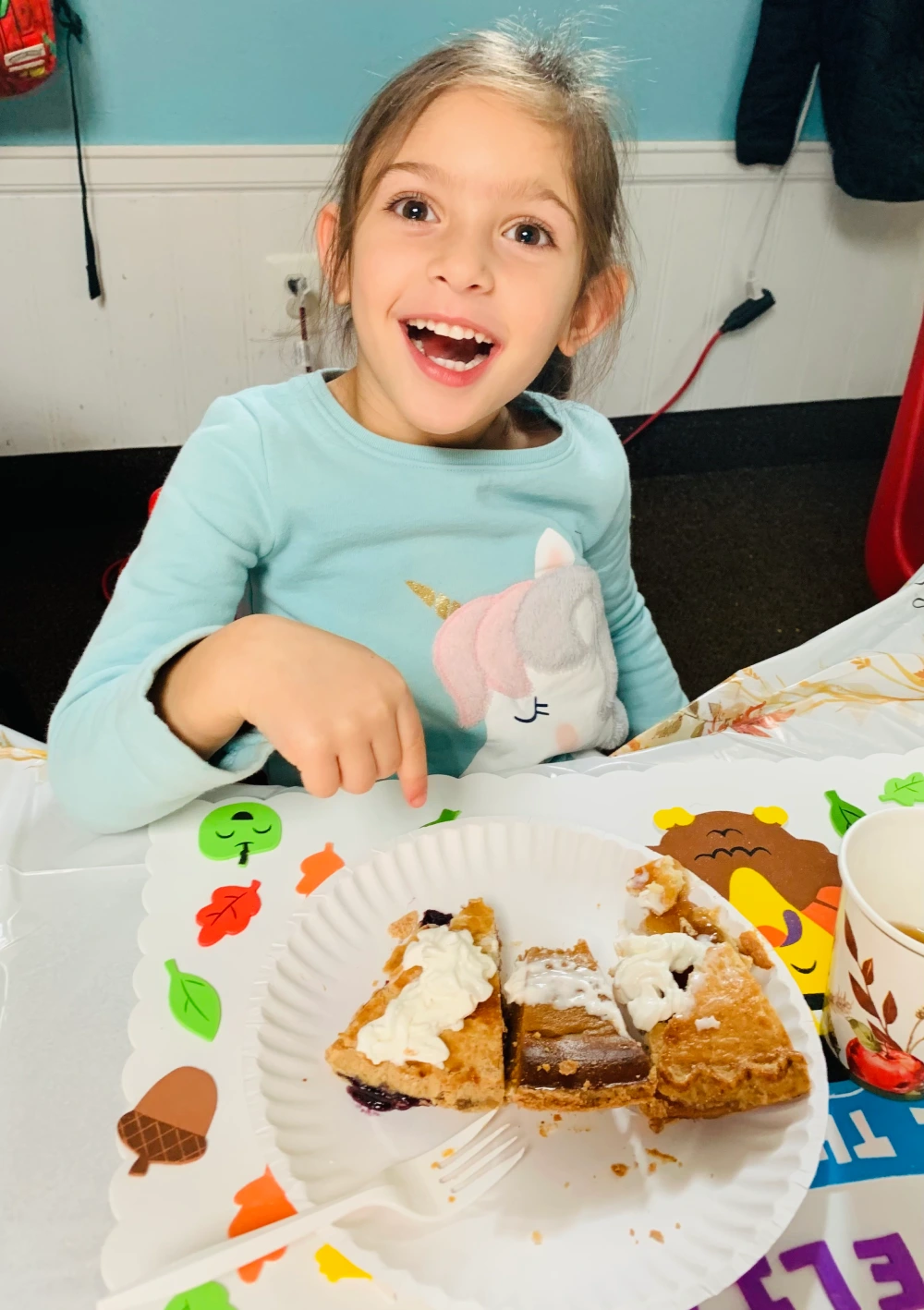
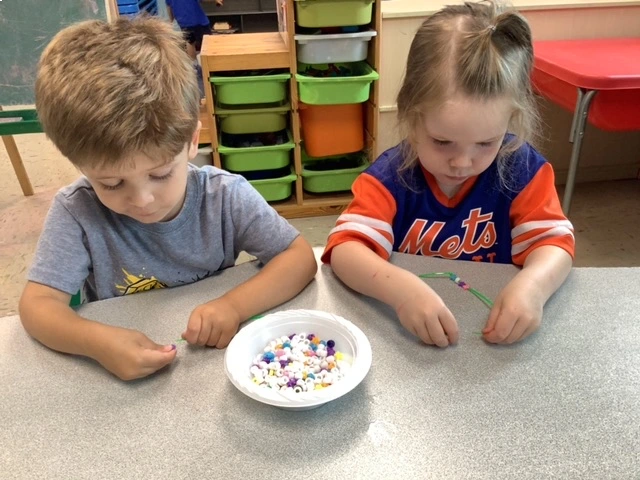
Educational Philosophy
The early years are the most important learning years. Children learn best through play and discovering on their own. Our goal is to foster a love of learning. We allow children to grow and learn at their own pace by offering a wide variety of age and developmentally-appropriate activities. We encourage children to be confident, independent learners. We believe that promoting growth in all developmental areas (socially, emotionally, cognitively, physically, and creatively) will help the child grow into a successful well-rounded member of their community.
Testimonials
Read a few words from our daycare parents.
Registration and Tuition
Tuition is on auto-pay every Monday
You are responsible for all payments once enrolled. This includes any school closings, illnesses, holidays, vacations, and snow days.
These prices are from 7:30 am - 5:30 pm. Part-time hours may be available depending on availability
Full Time:
Monday-Friday
7:30 am - 5:30 pm
5 Days Per Week
$475.00
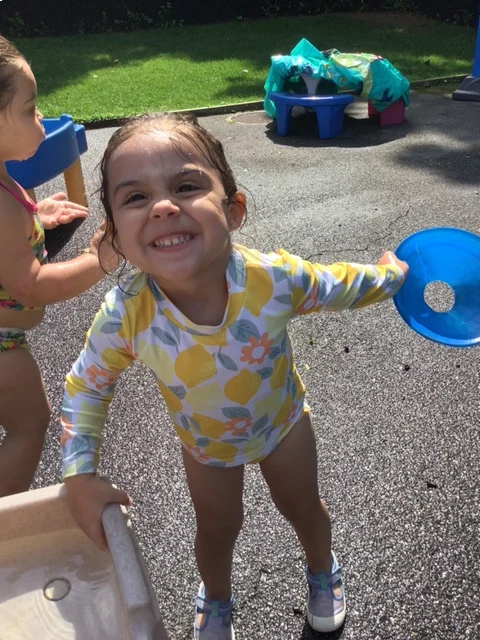
Part-Time:
4 Days Per Week $425.00
3 Days Per Week $375.00
2 Days Per Week $250.00
Non-Refundable Registration Fee: $100.00
Second Child: $50.00Security:
One Weeks Tuition
This is returned to you providing a two-week written notice is given when removing your child from Rascals. If your child is registered to start Little Rascals and you are withdrawing before you start then your one week security and registration is Non-Refundable.
Other General Information:
Rascals Provides: Breakfast, Morning Snack, Lunch, and Afternoon Snack
Milk is also Provided Daily
For Babies: Parents Provide Formula and Food
Parents also Provide Diapers, Wipes, Diaper Creams/Powders, Sippy Cups, Bottles, Change of Clothes and Crib Bedding or Blanket.
Curriculum
Classroom Centers
Classroom centers are set up in each room so the children are exposed to a diversity of ideas, concepts, and skills. The centers are designed to meet the developmental goals of children. The classroom centers are Music, Movement/Dance, Science/Sensory, Table Top/ Manipulatives/Math, Blocks, Dramatic Play and Literacy
Art
Art provides a way of expressing human behavior, emotions, and experience. A child's visual awareness of color, coupled with form and line, becomes a part of his or her everyday life and experience. Creating art supports young children's development across several different domains. Using art tools helps children develop small muscle coordination and control. Children can practice thinking skills by experimenting with color, texture, and design. Art gives children an opportunity to express their ideas and feelings, relieves tension, and provides limits for self-discipline. Art allows children to achieve and expand their creativity.
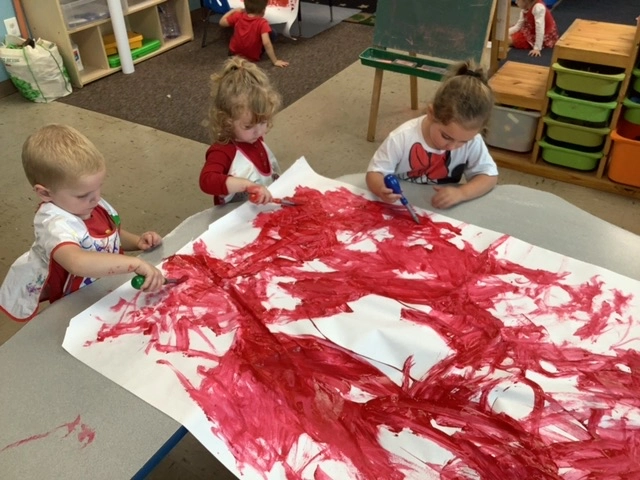
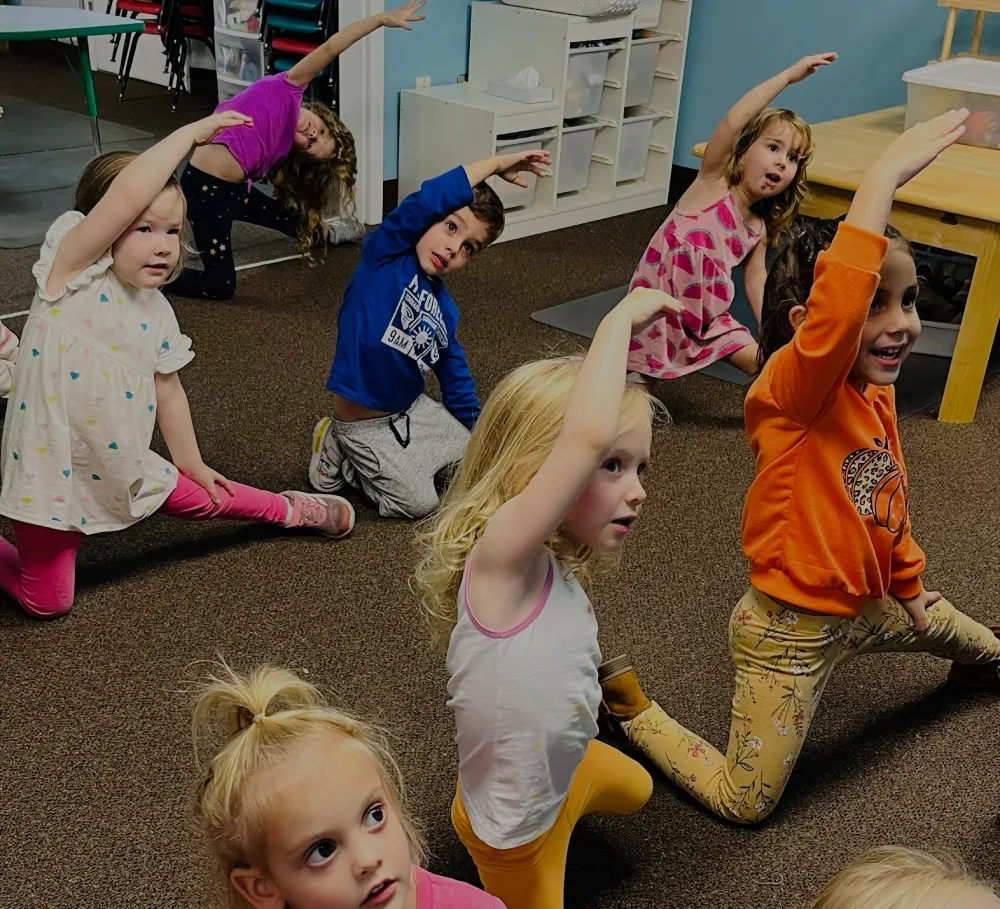
Music & Movement/Dance
Music is a universal language understood by all. Listening to music, singing, playing musical instruments, and moving to music are all activities that support children's development across several different domains. Children practice words and phrases in repeating patterns by listening to and singing songs. They also become aware of the rhythms of language and the patterns of poetry. These skills help them become better at understanding and producing language and prepare them to identify patterns when they begin to read. Music can provide opportunities for interaction with adults and other children, which is the foundation for relationships. Music can help children develop an understanding of people and their cultures. It also provides children with opportunities for creative expression through storytelling, puppetry, creative movement and dance, or songwriting. Music provides opportunities for turn-taking and matching up with a group's tempo and tone. These opportunities can be positive social interactions with peers and adults in which children practice social skills for conversation such as listening and responding. The music center provides a place where children can play alone or with a few other children. The music center stimulates thought and imagination, as children learn the words to songs or produce their own music and creative movement. Experiencing movement helps improve listening skills. Children may enjoy recording themselves with audio or video recorders individually or in small groups so they can reflect on their musical creations and see their own skills develop.
Science/Sensory
Discovery methods used in teaching science encourage the young child to ask questions. It introduces scientific concepts such as sinking, floating, and changes of state (e.g., dry to wet). Exploring with sensory materials gives children opportunities to practice measuring and explore other math concepts such as more, less, bigger, smaller, and equal. Children playing at the science/sensory center are practicing eye-hand coordination and using fine motor skills to scoop, sift, funnel, and pour. This center provides important opportunities for children to practice cooperative play and sharing. It also helps children explore and enjoy the sensory experience of manipulating fluid materials. It can also reduce the energy level of overexcited children and provide an acceptable way for them to vent anger or frustration.

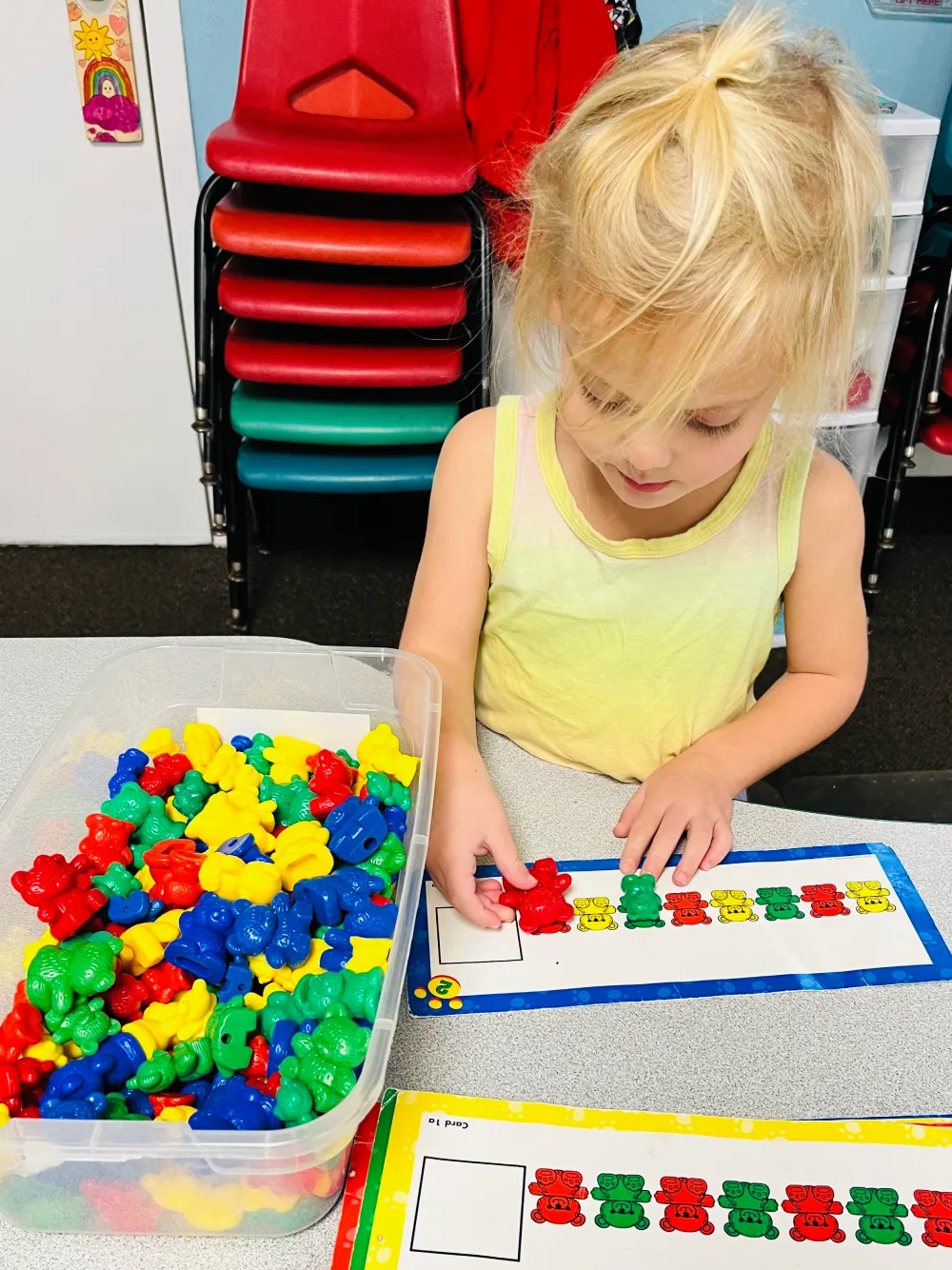
Tabletop/Manipulatives/Math
Independent learning activities and games encourage children to use instructional materials for learning math. A wide variety of materials used in child care and early education programs fall into the category of "manipulatives," including different types of building bricks and toys, collections of objects for sorting, small dolls and animals, and many other types of toys. Manipulatives, sometimes referred to as table toys, are an important part of the early childhood curriculum because children can use them to practice a wide variety of skills. Some of the most common skills children learn by using manipulatives include Fine motor skills, eye-hand coordination, visual discrimination, recognition of shapes, colors, and textures, comparison of similarities and differences, matching, classification, and pattern recognition, following directions, following sequences, and concentrating for completing tasks and chances to practice creativity and problem-solving.
Blocks
Educators for generations agree young children learn best through play. As children explore the world around them, they mature through these environmental interactions. Block play offers children both basic skills and creative outlets. Accessories make a difference in imagination when children use blocks. Children working with blocks have a chance to use their ideas to produce real structures. Building complex block structures requires children to understand a variety of math concepts, including size, shape, number, order, area, length, pattern, and weight. Children can practice comparison, measurement, and classification, among other essential thinking skills. The block area is an ideal place for children to practice new vocabulary by using words to describe types of buildings, shapes, and structures. When planning a structure together, children must use verbal communication skills. It enhances language skills by using new vocabulary words, encouraging children to describe their structures and their building process, and encouraging children to write stories about the structures they create. When working together in the block area, children begin to practice negotiation. They get experience following rules, sharing their ideas and insights, and looking at the world from the points of view of others.
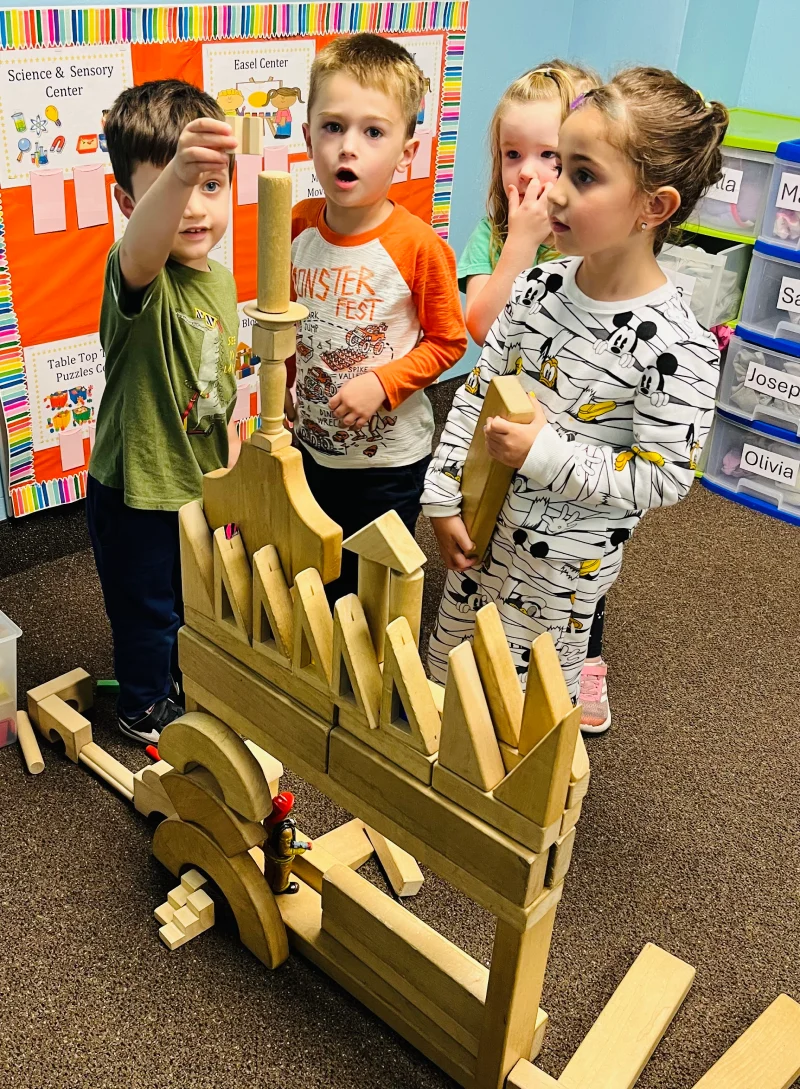
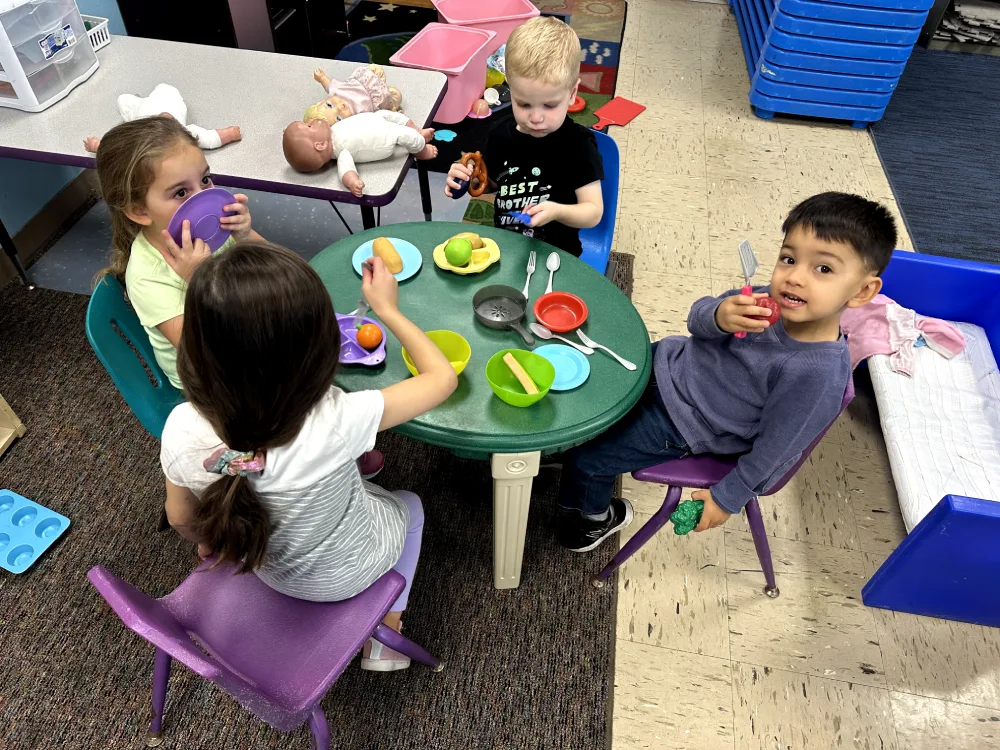
Dramatic Play
Through dramatic play, children identify with models, roles, and unique situations in their environment. Through meaningful experiences in expressive play, young children develop positive, comfortable feelings about themselves. Engaging in dramatic play enhances young children's development. Pretending builds social skills, makes children more aware of their own emotions, and encourages shared language and problem-solving. As children play and interact in the dramatic play center in an early childhood program, they practice skills in negotiating different roles and themes, cooperating to keep the play happening, and acting out roles and situations. They increase large and small muscles to put on costumes and manipulate props, practicing eye-hand coordination. They are thinking of and acting out a story, organizing and expressing ideas, paying attention to how other people see the world, and finding creative solutions to challenges. They are also increasing language skills by asking and answering questions, using language related to a role they are playing (e.g., "May I take your order?"), and learning early literacy and writing skills.
Literacy
A solid foundation in the language arts, including reading, listening, writing, speaking, and thinking - a skill that ties all the others together - is the basis for all school programs and for life in general. Children who master these skills develop a relationship between oral language and written symbols. The Literacy Center focuses on reading, writing, listening, and speaking. It can be a great place for children to play alone or with one or two other children. Having access to books stimulates children's imagination and thinking skills, encourages the development of language, and provides opportunities for creative expression through storytelling or puppetry. Adults can encourage children's learning about words, sentences, and the rhythm of language by reading stories and poetry aloud. Children can practice book-handling skills, retell stories by "reading" the pictures, and develop a love of reading by having the chance to interact with books regularly.
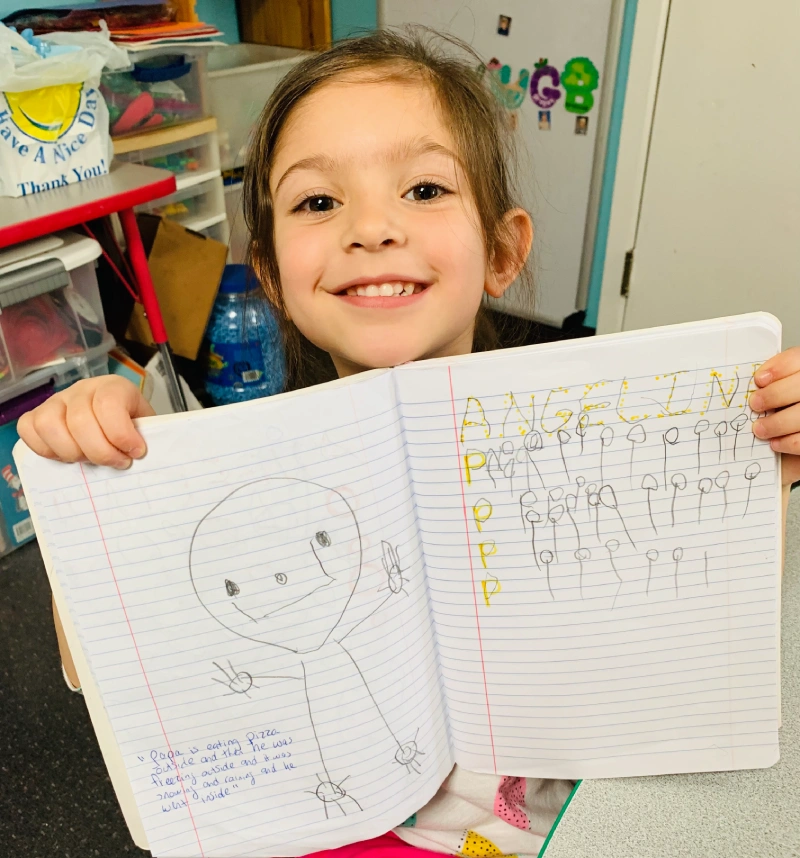
| Month | Theme/Concept |
|---|---|
| September | A & B, Red, Circle, #1, Apples, Fall |
| October | C & D, #2, Square, Halloween, Pumpkins, Orange |
| November | E & F, #3, Thanksgiving, Rectangle, Brown, The Farm, Farm Animals |
| December | G & H, Star, #4, Winter Holidays, Festive Colors |
| January | I, J&K, #5, Triangle, Snow, White |
| February | L, M & N, #6, Valentine's Day, Heart, Pink |
| March | O, P & Q, #7, Shamrock, St. Patrick's Day, Green |
| April | R, S & T, #8, Oval, April Showers Spring Holidays, Blue |
| May | U, V & W, #9, Purple, Mother's Day, Flowers, Diamond, |
| June | X, Y & Z, #10, Father's Day, Zoo/Zoo Animals, Yellow |
| July | 4th Of July, Ocean/Beach |
| August | Rainbows, Bubbles |
Meals
We provide Breakfast, A.M. snacks, Lunch, and a P.M. Snack. Parents can bring in their meals as needed. Substitutions are made when needed.
View Meals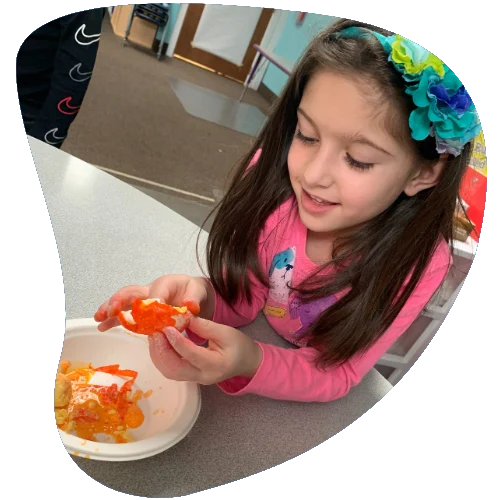
Parent Information
We are located at 5770 Merrick Road in Massapequa on approximately half an acre of land. Our Daycare has 5 classrooms on the first floor and 1 classroom on the second floor. There is a playground suitable for all ages.
- The hours of the facility are 7:30 a.m. – 5:30 p.m.
- You can drop your children off or pick them up anytime.
- If you are running late, you must make other arrangements for your child to be picked up.
Holidays Closings 2025
- Martin Luther King Day, Monday, January 20th
- President's Day, Monday, February 17th
- Good Friday, Friday, April 18th
- Memorial Day, Monday, May 26th
- Juneteenth, Thursday, June 19th
- Independence Day, Friday, July 4th
- Labor Day, Monday, September 1st
- Columbus Day, Monday, October 13th
- Veterans Day, Tuesday, November 11th
- Thanksgiving, Thursday, November 27th
- Thanksgiving, Friday, November 28th
- Christmas Eve, Wednesday, December 24th
- Christmas Day, Thursday, December 25th
- Christmas, Friday, December 26th
- New Years Eve, Wednesday, December 31st
- New Years Day, Thursday, January 1st
- New Years, Friday, January 2nd








